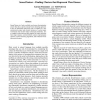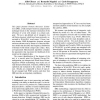37 search results - page 4 / 8 » Evaluation of Clustering Algorithms for Polish Word Sense Di... |
AAAI
2004
13 years 9 months ago
2004
SenseClusters is a freely available word sense discrimination system that takes a purely unsupervised clustering approach. It uses no knowledge other than what is available in a r...
WWW
2008
ACM
14 years 8 months ago
2008
ACM
In a higher level task such as clustering of web results or word sense disambiguation, knowledge of all possible distinct concepts in which an ambiguous word can be expressed woul...
CICLING
2010
Springer
14 years 2 months ago
2010
Springer
Recent research works on unsupervised word sense disambiguation report an increase in performance, which reduces their handicap from the respective supervised approaches for the sa...
TSD
2001
Springer
14 years 8 days ago
2001
Springer
Two kinds of systems have been defined during the long history of WSD: principled systems that define which knowledge types are useful for WSD, and robust systems that use the info...
EMNLP
2004
13 years 9 months ago
2004
This paper presents Domain Relevance Estimation (DRE), a fully unsupervised text categorization technique based on the statistical estimation of the relevance of a text with respe...


